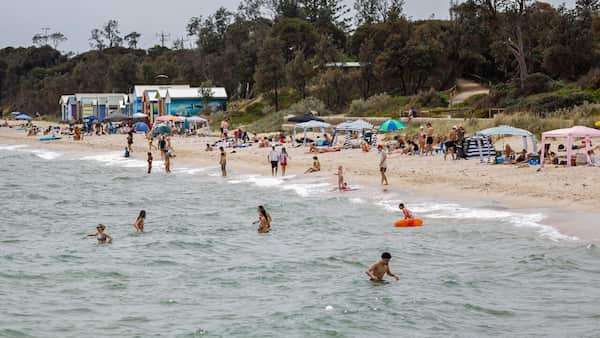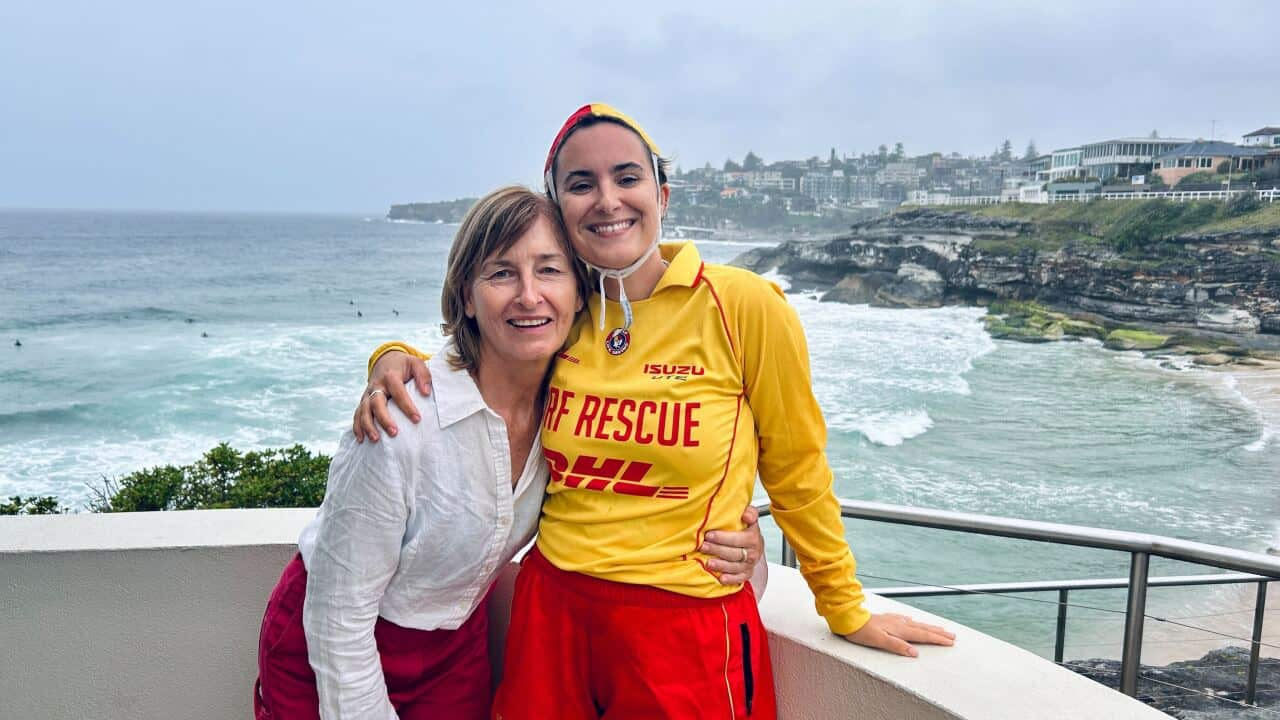When Sandra Fox became the president of Tamarama Surf Life Saving Club (SLSC) at the end of 2024, she had a vision for its transformation.
The 119-year-old club, nestled between Sydney's Bondi and Bronte beaches, is one of the oldest in the world and has long been helmed by men: Fox is its first woman president.
Fox joined the club during the 2003-04 surf season after she had just completed a Master of Business Administration (MBA) degree and was looking for a new project. Over two decades, she has broken the proverbial glass ceiling at Tamarama over and over again: as the club's first woman club captain, chief training officer and life member.
"As I progressed through Surf Life Saving, I remember at club, branch and then state level often being either the only woman or one of only a couple women in the room," says Fox.

Tamarama Surf Life Saving Club’s current membership is visibly more diverse than what's depicted in this photograph from the club’s 1975-6 season report.
Together with her leadership team and grassroots members, Fox has championed a strategy of diversity and inclusion to attract newcomers, enhance the experience of existing members and drive towards Surf Life Saving Australia's (SLSA's) overall mission: to reduce coastal drownings to zero.
"Diversity of thought always improves outcomes," she says.
"Historically, surf lifesaving culture was organised around white men doing manly things. That's changed now."
'Courageous women'
Surf lifesavers are Australia's volunteer lifeguards. With more than 180,000 members contributing to 314 affiliated clubs, it's the largest volunteer lifeguard organisation in the world and the largest volunteer organisation in Australia.
Lifesavers — colloquially known as 'clubbies' — are identifiable by their iconic red and yellow uniforms and trained in surf rescue techniques and first aid.

Trainee surf lifesavers become known as ‘Bronzies’ when they complete their Bronze Medallion Award.
It's taken a number of courageous women leaders to stick their necks out to make others feel welcomed in this space.
Despite her administrative responsibilities at the club and day job as a business director at CSIRO, Fox is still seen regularly paddling out in the surf on a rescue board during early morning training sessions.
"Our new clubhouse has been under construction for three-and-half years, we've had nowhere to train, no bar, nowhere to socialise — yet the club is now stronger, in spirit and in numbers than ever before," Fox says.
'Never seen the ocean'
Beyond the transformation of its club culture, Tamarama SLSC has been at the forefront of innovative programs that combine inclusivity and beach safety.
The club hosts beach safety programs for new migrants to Australia, led by Michelle Cowans, and funded by Surf Life Saving New South Wales.

Migrant Beach Safety Days are hosted by Tamarama SLSC to help educate members of communities that have minimal experience in the surf.
"The students have zero or near zero English language skills. Some have never even seen the ocean before," Cowans tells SBS News.
"Tamarama is a very little beach and it's one of the most dangerous on the eastern seaboard due to its large swell and fixed rip currents.
"At the end of the session, we release an environmentally friendly green dye into the water to show how fast the rip travels. It's an impressive sight." In the first six months of 2024, there were 323 drownings in Australia's waterways, according to SLSA's National Drowning Report 2024.

A green dye in the water highlights the speed and direction of Tamarama beach’s fixed rip current.
"We never lose sight of the central mission of surf lifesaving, which is to have zero deaths by drowning on Australia's beaches," says Cowans.
"We know that word of mouth is one of the best ways to spread a message and so we bring newly arrived migrants to the beach and hope they take home the learnings to their friends and families."
LISTEN TO

Record numbers of young people and migrants figure in drowning deaths
SBS News
03:00
'The ocean doesn't discriminate'
Inclusivity in surf lifesaving is not just about safety, says Tamarama SLSC's vice president Zoe Scott-King, a straight-talking, powerhouse of enthusiasm.
"We've worked hard to make Tamarama a place where you can bring your full self to the beach and everyone feels like they belong," she says.
In 2021, Scott-King launched an initiative at Tamarama called 'She's a Lifesaver', a series of profiles of female-identifying lifesavers at the club. She had become fed up with unrealistic portrayals of women at the beach on social media and wanted to offer an antidote.
"I thought: 'Look at the amazing women we have at Tamarama and look at what they actually do in the surf!' There's none of this parading around in your bikini looking for external validation," says Scott-King.
"We wanted to promote the fact that any woman who can swim can be a lifesaver because let's face it, women haven't had a place in surf lifesaving for very long."
In 2023, when the club's first openly trans members joined, Scott-King realised she needed to broaden her gender inclusion drive and began leading a series of inclusive swims and social events for women and gender-diverse people.
"Compared to the wider corporate world in which I work, where life can feel quite conservative, Tamarama is an authentically inclusive community, which we throw our hearts into," says Scott-King.
Dr Jake Little is the chair of Lifesavers with Pride, an independent body leading inclusivity initiatives for LGBTIQ+ lifesavers and allies, and says that Tamarama has been a "standout" club when it comes to LGBTIQ+ inclusivity.
"One way to make sure there are zero preventable deaths across Australia's beaches is to attract new members and have the very best volunteer lifesavers who feel like they are heard, valued and can be their authentic selves.
The ocean doesn't discriminate and neither should we.
The future of LGBTIQ+ inclusivity at Tamarama is now being championed by lifesaver and radio presenter Ce Benedict, who says more work needs to be done to help trans members stay active.
"A lot of queer people are in more precarious financial positions," says Benedict.
"Data shows that trans people don't have the same incomes as cis people. Because this is a volunteer organisation, it's very easy for this to be the thing that you drop."

Rainbow Beaches is an LGBTIQ+ inclusivity day organised by Lifesavers with Pride, first supported by Tamarama SLSC in 2021. This year 131 Surf Lifesaving Clubs across the country will participate in the event.
Peter George, head of mission at SLSA, acknowledges that Tamarama SLSC has been a leader in progressive surf lifesaving culture for some time but says there is also "sensational" work being done at clubs across the country.
"We've run a number of programs for the Aboriginal community, including an Indigenous engagement program since 2008," he says. "Last year, Adaptive Competition was introduced into the Australia Surf Life Saving Championships for the first time, allowing athletes of all abilities to take part.
"SLSA wants to reflect the community we serve."
In 2024, the peak body also published for the first time a diversity, equity and inclusion framework, which George adds is designed to ensure "the culture is embedded in all of our clubs".
Stream free On Demand

Diversity Dilemma
episode • Insight • Current Affairs • 51m
episode • Insight • Current Affairs • 51m
Friendships for life
As the final building works wrap up and Fox and her team take full possession of Tamarama's new clubhouse from Waverley Council, the club will finally be able to host its belated Christmas party and celebrate the friendships formed from its members' mutual love and respect for the ocean.
"My closest friends are mostly those made through twenty years of lifesaving," says Fox.
"The spirit of volunteerism is alive and well within Australian surf clubs and it's been a joy to see them become more inclusive over the years, which will set them up well for the future."
Editor's note: Charlie Bell is a member of Tamarama Surf Life Saving Club.

